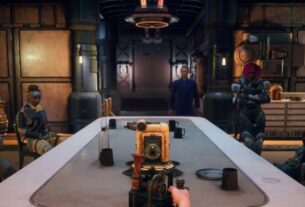
The world of Othercide — a new turn-based tactics game from developer Lightbulb Crew and publisher Focus Home Interactive — is steeped in bleak tragedy, gothic horror, and neo-noir influences. Occult and otherworldly horrors abound, and you rely solely on the capabilities of “Daughters,” your characters or units that have traditional classes, to forge a path.
Othercide also emphasizes brutal and punishing difficulty, and you might even need to restart your playthrough a few times until you get some of the perks you want. It’s a rogue-lite title, after all, a genre that emphasizes restarting until you get things right.
Othercide: The story so far
In the dark world of Othercide, you’ll learn about a “Lost Child,” one who’s slowly influenced and corrupted, seeking to damn the “Mother” into an eternity of hell. The Child does succeed very early on in the tutorial, and so it’s now up to “Daughters” — beings that have been created by the Mother — to counter the threat.
Yes, Othercide does have a story, but its bizarre and occult-themed narrative is told in such a cryptic manner that you’ll likely tune it out within the first chapter. There are, however, a few lore tidbits in the form of codices that can be collected when you kill enemies. These provide you with some additional information regarding the Mother’s past as well as various events surrounding the game world.
Speaking of the game world, the generated maps are fairly limited and repetitive, rendered predominantly in shades of black, white, and grey — there’s an occasional smattering of red in terms of blood, special effects, and attacks too. It’s bleak, grim, dreary, and, at certain points, even disturbing. The only downsides are that you can’t rotate the camera (if you want to see the tiles behind an object) and that skill effects can sometimes overlap with others (making it harder to distinguish between friendly and hostile attacks).

You know the day destroys the night
As mentioned, Othercide‘s combat basics follow what you expect from other games in the turn-based tactics genre. You move from tile to tile and then attack, spending action points (AP) as you go along. The main difference, though, is its reliance on the dynamic timeline system. In some ways, you might be reminded of titles like Grandia, Child of Light, or the more recent XCOM: Chimera Squad.
When you use your action points, your character will be moved further back on the initiative bar (as expected). Now, if a Daughter ends her turn early with 50+ AP to spare, she can act again in a short while. However, if you go overboard (ie. go even a single point below that 50 AP threshold), you’ll enter a “burst” status that puts that Daughter all the way at the end of the timeline. Of course, you’ll notice that most attacks will cost 30+ AP anyway, so good luck moving long distances and being able to attack.
When a Daughter enters a “burst” status, monsters could move and attack multiple times before that character can be used again. In some cases, this could lead to needless deaths due to Othercide‘s difficulty and relentless enemies (more on these concepts later). The good news is that you can play around with the timeline system since there are class-based skills that can delay mobs or boost your Daughter’s initiative.
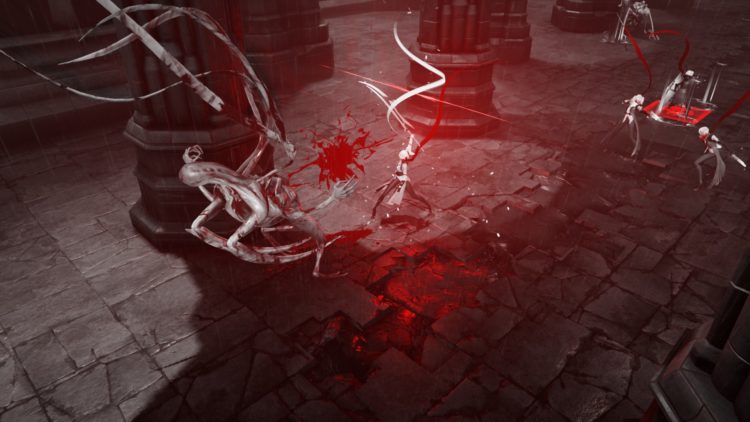
Don’t call me daughter
Daughters in Othercide can come in four classes: Blademaster, Shieldbearer, Soulsinger, and Scythedancer (the last one is unlocked halfway through the game). Each class specializes in a particular role on the battlefield. For instance, the Blademaster does tremendous damage in melee range while the Soulsinger provides support as the game’s only ranged class. The Shieldbearer, meanwhile, fulfills that tank role whereas the Scythedancer is great against armored units.
Daughters, as they level up, can be granted new skills (you’ve got two to choose from every five levels). These skills, in turn, can be slotted with “memories” or mods that increase their damage or add new effects such as armor reduction or initiative delay.
On paper, the goal is to mix and match the Daughters you have. You send them out in groups to finish the game’s handful of mission types while using their skills to your advantage. Then, once you’ve obtained more abilities, you can even unleash a few combos to maximize each turn. Sounds good, right? Unfortunately, that goal falls flat due to Othercide‘s difficulty spikes and progression system.

How long, how long will I slide?
What’s the hardest game you’ve played? Dark Souls? Ninja Gaiden? Ghosts ‘n Goblins? Cuphead? Battletoads? There are difficult games that’ll stump you, but you’ll often welcome the challenge. Then, there’s Othercide. I think the difficulty spike here comes from the fact that this isn’t something you’re used to in most turn-based strategy games. Additionally, there’s no healing at all between battles unless you sacrifice a Daughter that has a similar level. Lastly, you’ll experience a few ridiculously tough moments that don’t just feel unfair, but wrong on so many levels.
One example I distinctly remember was doing a random “Rescue” (VIP/escort) mission. In Othercide, you can expect a hellacious time because of small, cramped maps and a limited number of Daughters. Combine this with a few action points, the “burst” mechanic, and half a dozen enemies at the start followed by new reinforcements (sometimes four or five at a time, including some elite-types), and you might be overwhelmed. The game even spawns hostiles next to the evac point once your VIP (known as a Bright Soul) reaches it because why not?
Assuming you play smart and just stick to a corner, these types of missions will become slogs that last 30 to 45 minutes that you’d want to avoid them entirely. In the end, regardless of certain mission types, your characters will probably be dead. If not, they’re beaten up so badly that you’ll need to level-up more Daughters just so they could be sacrificed for healing purposes. Oh, and I haven’t even talked about some of the boss fights. Those can be a doozy, but I won’t spoil them in this review.
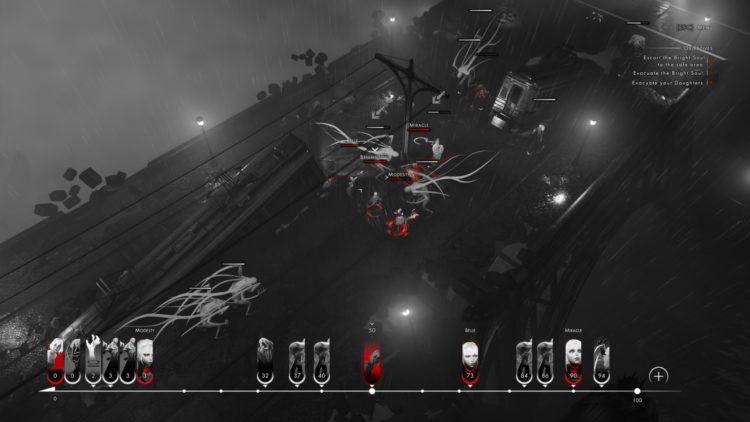
I tear it down and then it’s born again
Othercide, fortunately, has another feature called “Recollections.” When all your Daughters die or when you get wiped by a boss, the campaign can be restarted. You may also do this at any point in time during your playthrough.
Now, if you’ve completed certain milestones (ie. deal a total of X damage or kill a total of Y enemies), you’ll unlock “Remembrances” which are perks that boost you throughout the campaign. Some might increase your XP gains while others provide tokens that resurrect dead Daughters.
My favorite Remembrances include those that let you skip the game’s chapters so that you don’t need to redo everything, as well as those that allow you to recruit Daughters that are already leveled-up. In fact, beating Othercide‘s final boss lets you recruit daughters at the level 15 cap already. That’s perfect for that one extra run where you’ll clear and collect everything without a single death (hopefully).
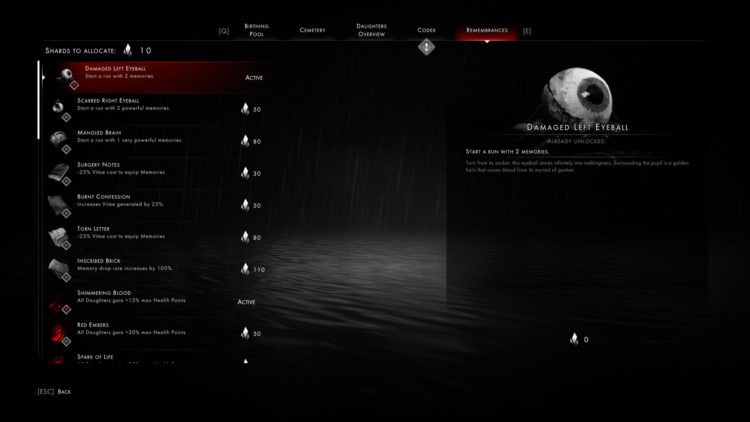
Othercide review: The final verdict
I definitely understand that a high degree of difficulty is expected in the rogue-lite genre and, truth be told, I’ve enjoyed my fair share of playing recent titles in the genre like Hades and Risk of Rain 2. Unfortunately, Othercide bears more similarities to (the currently shoddy) Dead Age 2 that’s still in Early Access. There’s a degree of difficulty in Othercide that does seem unfair and, in some cases, also random — such as getting a trait that lowers XP gains or completing a requirement for a Remembrance that increases action points.
Harder games can be considered “fun,” “exciting,” or “learning experiences.” Othercide, sadly, needs a lot of getting used to. Since this is a turn-based tactics offering, the overall progression will be very slow, methodical, and time-consuming (much like that example about Rescue missions). If you compare this to other titles with only a dungeon crawl, a quick match, or a short romp, then a failed run in Othercide will be akin to an abject waste. It takes a long while before you get the perks needed to complete early chapters or boss fights, and even longer to obtain abilities or traits that can truly turn the tide of battle (or maximize the combo system). Even as someone who enjoys tougher games, turn-based strategy titles, and rogue-lites, Othercide‘s flawed combination of these mechanics leads to a presentation that’s more tedious and bothersome.
There is, thankfully, a silver lining in this gray world, and it’s that all your efforts and failures might bear fruit many hours later. It took me a couple of restarts during the first chapter before I obtained everything I needed then. That’s when I breezed through to the finale and, even then, I also had to restart at an earlier chapter to earn more XP and enable more perks. If you have that much patience, then Othercide might feel worthwhile. If not, then Othercide will frustrate you to no end.
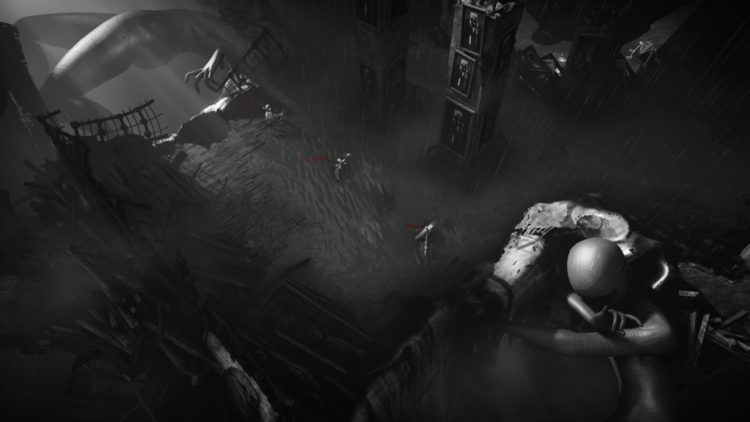
Othercide releases on July 28 via Steam. You can purchase the game for $34.99. If you grabbed the game and need help with the challenges and content, head over to our guides and features hub.
Othercide
Othercide has a number of interesting quirks and its art design, with gothic and noir elements, creates a uniquely forboding atmosphere. Unfortunately, it’s also got a ridiculous degree of difficulty that you normally don’t associate with the turn-based strategy genre. The game’s roguelite concepts are more than welcome, though repetition and restarts, combined with the genre’s slower progression and mission system, will make playthroughs feel like time-consuming affairs.

